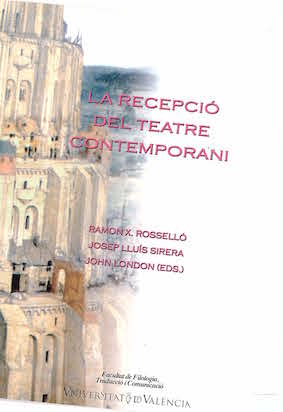La recepció del teatre britànic contemporani al teatre comercial durant el règim franquista
DOI:
https://doi.org/10.7203/qf-elit.v15i0.3980Paraules clau:
recepció, teoria de Polisistemes, teatre britànic contemporani, teatre espanyol, teatre català Resum
Resum
Aquest article sobre la recepció del teatre britànic contemporani al teatre comercial de la dictadura constitueix part de les conclusions d’un estudi més ampli sobre la recepció del teatre britànic contemporani a l’Estat espanyol des de 1956 a 2004. Tot partint dels pressupòsits teòrics de la Teoria de Polisistemes, s’ha emprat una metodologia de recerca pròpia, donada la manca de models pràctics aplicats als estudis teatrals. Aquesta metodologia parteix d’una sòlida base documental sempre contextualitzada pel sistema polític, social i cultural i teatral de l’Estat durant moment històric sota estudi i en diàleg amb el context de recepció original. El resultat és una panoràmica rigorosa que, lluny de cànons i d’idees preconcebudes, mostra que el teatre comercial britànic tingut un pes considerable en la caracterització el teatre comercial de l’Estat de la dictadura i, per això mateix, en part ha contribuït a delimitar el teatre renovador i compromés del període.
 Descàrregues
Descàrregues
Descàrregues
Com citar
-
Resum126
-
PDF (Español)129
Número
Secció
Llicència
 Este obra está bajo una licencia de Creative Commons Reconocimiento-NoComercial-SinObraDerivada 4.0 Internacional.
Este obra está bajo una licencia de Creative Commons Reconocimiento-NoComercial-SinObraDerivada 4.0 Internacional.
Tots els documents inclosos a OJS són d'accés lliure i propietat dels seus autors i/o institucions editores, i per tant, qualsevol acte de reproducció, comercialització, comunicació pública o transformació total o parcial necessita el consentiment exprés i escrit d'aquests.
________
Authors who publish with this journal agree to the following terms:
- Authors retain copyright and grant the journal right of first publication with the work simultaneously licensed under a Creative Commons Attribution License that allows others to share the work with an acknowledgement of the work's authorship and initial publication in this journal.
- Authors are able to enter into separate, additional contractual arrangements for the non-exclusive distribution of the journal's published version of the work (e.g., post it to an institutional repository or publish it in a book), with an acknowledgement of its initial publication in this journal.
- Authors are permitted and encouraged to post their work online (e.g., in institutional repositories or on their website) prior to and during the submission process, as it can lead to productive exchanges, as well as earlier and greater citation of published work (See The Effect of Open Access).



